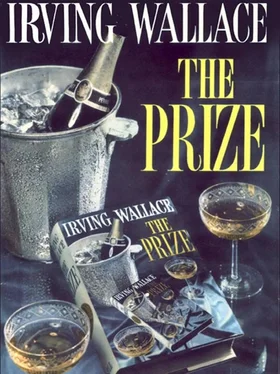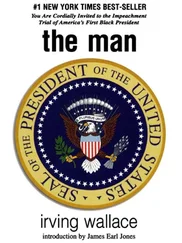The King was amused. ‘If you wish so to regard it, Mr. Craig.’
‘I am sincerely flattered and inspired. You shall have the first copy, Your Majesty.’
The monarch moved on, to the continuous hand shaking and curtsying, and Craig realized that he had, indeed, been flattered by the ruler’s interest, but not inspired, not inspired at all, for the King’s sovereignty was temporal and earth-bound to this land, and Craig paid obesiance only to the Muse-once Clio, now Calliope. With regret, he resigned from his promise to the King of Sweden.
He heard Leah’s troubled whisper. ‘How could you joke with His Royal Highness like that?’
‘He didn’t seem to mind.’
‘How do you know? Oh, Andrew, I’m so mortified-’
‘He enjoyed it,’ said Craig between his teeth.
‘Even if he did, you’re so irresponsible when you drink-what’ll you do next?’
‘For Chrissakes, Lee, we’re the hit of the evening. I won’t criticize your curtsy, and don’t you knock my dialogue. Now, please behave.’
‘Everyone saw you go in that corridor to the bedroom-’
‘What of it? It’s not a whorehouse.’
Leah gasped, blushing and pulling back. Her eyes darted around the room, seeking to learn if Craig had been overheard. She saw that he had not been, and she started to speak again, and then held her tongue, and settled into sullen taciturnity.
Across the salon, the King had finished his social duty, and now, at the entry to the Charles XI’s Gallery, he waited for his royal entourage. Followed by the royal princesses and princes, he went into the dining-room. At once, the semi-circle of guests broke forward, unevenly, falling into a column at the entry, and marching into the Royal Banquet.
Presently, Craig found himself seated, by place card, between Leah and Ingrid Påhl, and perhaps thirty feet from the King, who was at the head table, quite isolated except for two princesses to one side of him, a prince and another princess at his other side, and a private uniformed waiter hovering nearby.
Befuddled by drink, Craig squeezed his eyes to make out his surroundings. He owed this careful inspection not to his writer’s memory file, but to Lucius Mack, his favourite pallbearer, as a conversation piece. Craig’s eyes studied the Gallery hall, and sorted out busts of a King and Queen of long ago on a shelf-like cornice, and several cabinets containing silverwork and amber and porcelain. The painted ceiling above-as he would later learn-recorded events in the reign of Charles XI and Ulrika Eleonora. From the ceiling hung a glittering chandelier, and immediately beneath it, on the table, a magnificent elevated vase, and before him, lustrous silver service.
He peered to see if the King had the same silver service, but something else beside the King’s plate caught his eye. It was a proletarian egg, curiously majestic, in a brilliant golden egg cup.
He shook Ingrid Påhl’s flabby arm, and pointed. ‘What’s that?’
‘Where?’
‘Next to the King’s plate. Looks like a plain ol’ egg.’
‘But it is, Mr. Craig,’ said Ingrid Påhl gaily. ‘It is a tradition. A long time ago one of the earliest Swedish Christian rulers-possibly Olof Skötkonung or Erik Jedvardsson-sat down to dinner with a bellyache, and rejected his rich meal, and demanded one ordinary boiled egg. This was unheard of-the egg was fare of the peasantry-and for one hour, the kitchens of the palace were ransacked for the simple egg, while the King sat fuming with impatience. At last the egg was found and served, but by then the King was beside himself. He made a royal proclamation. From that day forward, there must always be one plain boiled egg beside the King’s plate, ready and waiting, should he ever desire it. For ten centuries the tradition has persisted. So now you see the royal egg.’
‘Charming,’ said Craig. ‘And over there, on the table behind him-?’
‘Yes, yes, his jewelled crown, his sceptre, his sphere and cross-power and justice-his horn holding the anointing oil. All symbols of his authority and prerogative. Again tradition, Mr. Craig. He does not wear the crown, and he does not brandish the sceptre. But they are there, you see, and he knows it, and the democratic government knows it, and the Swedish people know it-and for all, it is something to trust and hold onto in perilous times. I think, Mr. Craig, there can be worse virtues than secure knowledge of continuity existing from the distant past and offering reassurance for the future. It is something that atheists and republicans miss, I imagine.’
‘It is a knowledge many Americans miss,’ said Craig sadly. ‘I envy you what you have-something to believe in.’
By then the caviar had been served, and Craig picked at it without appetite. Glancing across the table, to see who was opposite, he recognized Stratman adjusting his bifocals, and next to Stratman, there was Emily, also picking at her caviar, eyes downcast.
Craig had no interest in the splendid dinner. All of his effort was concentrated on catching Emily’s eye, and somehow letting her know that he had been foolish and must have her pardon. From time to time, steadily, in the next hour and a half, he stared at her. Ingrid Påhl spoke to him, and Leah spoke to him, but he did not hear them. The hot dishes came and went-the consommé, the marinerad sill (which tasted like sweet smelts), the large cut of venison with currant jelly, the tender reindeer steak, the concoction of lettuce, fruit, peas, shrimps and sliced mushrooms identified as västkrustsallad , the traditional bombe with its regal crown of sugar-but Craig left most untouched, and when he ate, he ate sparingly. He had requested more champagne, and this he drank through the entire feast. In all this time, as he stared at Emily, she refused to lift her head and acknowledge his existence. Since the table was wide, and the vase was a barrier, and Leah another, he could not address her.
Morosely, he drank, once responding to a formal toast to His Royal Highness, and another time toasting the memory of Alfred Nobel. His inner emotional barometer rose to self-righteousness and dropped to self-pity. For a short period, he resented the injustice of Emily. After all, he asked himself, what had he done that was so sinful and wrong? He had lured a pretty girl into a private room and had told her that she was beautiful and that he wanted to kiss her. Was that a crime? Hell, no, it was a compliment, and any other girl would have been proud of it-from a Nobel laureate, at that. The failure was her own, not his. Chrissakes, he hadn’t violated or hurt her, had he?
Then, for another period, he decided that he had, indeed, violated and hurt her. Every woman, he told himself, is vulnerable in different ways, and hurt has its many varieties. One woman you would injure and spoil by physical defilement-by forcible entry into her body. Another woman you would wound by mental defilement-by insult and disrespect through words or actions. Obviously, Emily Stratman was the second woman. Undoubtedly, she was shy of men, probably a virgin, who regarded even the small acts of coercion-words of seduction, a kiss, an embrace, a stray hand-as an attack on her private and individual womanhood and an act of ravishment. When he came to this understanding of her, Craig was once more depressed and mortified.
But then again, after yet another goblet of champagne, the barometer rose in his favour. What did he give a damn about her for anyway? There had been no real women since Harriet, and he had been spared emotional turmoil about other women because he had been so devoted to his personal turmoil and guilt. Under these conditions, this Emily person was an intruder. For a moment, finding her, he had been bold enough to cross the forbidden frontier back into reality, and it had been as unpleasant as he had always feared it might be, and now he was glad to go back to where he had come from. Women died with Harriet. To hell with them all. Good-bye, Emily.
Читать дальше












